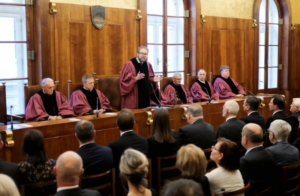Constitutional Court Judge Klemen Jaklič has become the conscience of the Constitutional Court, as well as its international professional reference. His dissenting opinions will be the basis for consistent constitutional law practice in the future, when the current “far-left six” are no longer on the Constitutional Court. This time, he delivered a dissenting opinion in a case where the Constitutional Court ruled on a petition for review of the constitutionality and legality of the Decree on the Municipal Spatial Plan of the Municipality of Ankaran, which changed the land use for the land owned by the petitioners from building land to agricultural or forest land.
The party in the proceedings before the Constitutional Court claimed that the amendments to the zoning act had changed the intended use of its land, which had negatively affected its buildability or use. For example, land that was previously classified as developable has become agricultural or forest land, which means that building on it is significantly more restricted or even impossible. According to previous case law, a legal interest in challenging such acts was only recognised if the party could not effectively challenge the change in the context of the building permit procedure. The new standard, however, allows for the existence of a legal interest already at the level of the amendment of the zoning act, provided that the provisions on the intended use are sufficiently specific to define the limits of the permissible use of the land. In Decision No U-I-332/22, the Constitutional Court introduced a new standard for assessing the legal interest in challenging spatial planning acts. This standard provides that the legal interest is already satisfied where the conditions for the intended use of land in the spatial planning act are sufficiently specific to enable the boundaries of the permissible use of land to be determined on the basis of those conditions.
The majority of the Constitutional Court judges, therefore, apparently believe that changes in the intended use of land already at the spatial planning stage may have a direct impact on the rights and legal position of individuals. In this way, they have broadened the understanding of the legal interest, as they consider that in certain cases, the zoning of land is already sufficiently concrete to allow for a review of constitutionality or legality. The judges consider that such an interpretation will ensure that the rights of individuals are more comprehensively protected in planning procedures.

A decision leading to arbitrariness and unpredictability
On the face of it, this is a minor judgment, but in reality, it is a landmark one, as it completely destroys the principle of legal predictability and leads to complete arbitrariness in judicial decision-making. The Constitutional Court judges have set a precedent for a broader understanding of the legal interest in challenging spatial planning acts, which opens the door to the arbitrariness of judicial decisions in the future and, thus, to legal predictability, as Judge Klemen Jaklič noted in his dissenting opinion.
What is at stake here? The Court is introducing a new “standard”, on an ad hoc basis, that in a specific part of spatial planning acts, virtually all the provisions of the act lay down the conditions for the intended use of land in such detail that the boundaries of the permissible use of land can already be determined on the basis of these conditions. The essence of the special part of the zoning act is precisely that – unlike the general part, it defines the detailed land use with detailed specific conditions and thus the very specific boundaries of permitted and unauthorised uses, noted Jaklič. Such a new “standard”, which covers practically all the provisions of the detailed zoning act, therefore does not say anything definite. It is no longer a standard at all, but “an open-ended blank bill of exchange which suddenly seemingly confers standing to challenge virtually all the provisions of a specific part of a zoning by-law.”
Jaklič also pointed out that the new standard is too vague and open-ended, allowing for abuse or arbitrariness. In his opinion, the essence of spatial planning acts is precisely the definition of the boundaries of use, and the new standard opens the door to challenging almost all provisions of these acts in practice. In his view, this does not lead to clearer case law, but rather to its disintegration, which reduces legal predictability and equality in decision-making.
“I did not support the decision because it introduces such a new standard for assessing legal interest, which is no longer even a constitutional standard, but only a semantically open, vague text,” Jaklič said in his dissenting opinion.
Increasingly open texts, even though the Court has already been reprimanded for this in the past
The change from relatively fixed, established standards to increasingly open texts is, in Jaklič’s opinion, also problematic for the Slovenian Constitutional Court because the Court has been the subject of criticism for this exact reason in recent years, with an increasing number of contradictory judgments leading to judicial arbitrariness in deciding future cases, or at the very least, it is no longer possible to prevent arbitrariness from happening.
“Dismantling rather than building up doctrine weakens the appearance of judicial independence and the role of the institution of the Constitutional Court. It is part of the mission of every constitutional court to try to build up the constitutional doctrine more and more and to prove the legal independence of its decision-making on the basis of its consistent application in concrete cases,” Jaklič concluded.
I. K.


